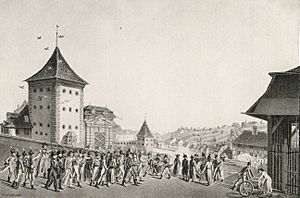Stecklikrieg facts for kids
Quick facts for kids Stecklikrieg |
|||||||
|---|---|---|---|---|---|---|---|
| Part of the French Revolutionary Wars | |||||||
 The death of Lieutenant Rudolf von Werdt on 18 September 1802, an episode of the Stecklikrieg. Pen and ink drawing by Karl Ludwig Zehender (1751–1814). |
|||||||
|
|||||||
| Belligerents | |||||||
|
Federalists
|
|||||||
The Stecklikrieg (which means "War of Sticks" in German) was a short but important conflict in Switzerland in 1802. It led to the end of the Helvetic Republic, a government set up by the French. After the war, French troops came back to Switzerland. This conflict also led to Napoleon creating the Act of Mediation in 1803. The war was fought between regular government forces and rebels, mostly farmers from the countryside. The name "Stecklikrieg" comes from the simple wooden clubs (Stäckli) that the rebels often used as weapons.
Contents
Why the War Started
After a peace treaty called the Treaty of Lunéville, French soldiers left Switzerland in the summer of 1802. This made the country very unstable. The government of the Helvetic Republic was weak. Many people, especially in rural areas, were unhappy with this government. They wanted more local control, like before the French arrived.
The Rebellion Begins
The rebellion started in central Switzerland. It spread to cities like Zürich and Bern, and also to rural parts of Aargau and Solothurn. The first fight happened on August 28 at Rengg Pass. In September, there were attacks on Bern and Zürich. Another fight took place at Faoug on October 3.
The government's soldiers were not well-equipped or motivated. The rebels, even with simple weapons, were determined. On September 18, the central government gave up its military fight. They moved from Bern to Lausanne. Soon after, the entire Helvetic Republic government collapsed. Local governments took over, and a meeting called a Tagsatzung was held in Schwyz. This meeting was led by Alois von Reding.
Unrest and Challenges
During this time, there was also social unrest. For example, in September 1802, there was a period of violence and looting. This happened because of the general instability and unhappiness with the new order. People's homes and belongings were damaged.
Napoleon's Solution
Napoleon, who was the leader of France, was worried about the problems in Switzerland. He thought this instability could spread to other parts of Europe. So, he decided to step in and help find a solution. He wanted to bring peace between the different groups in Switzerland.
The Act of Mediation
Napoleon created a new plan called the Act of Mediation. This plan gave some power back to the local areas, which is what the rebels wanted. It moved away from the strong central government of the Helvetic Republic. Napoleon believed that Switzerland naturally worked best with a system where local regions (cantons) had more power. He said that trying to force a different system on them was not a good idea. This act helped to bring a new period of stability to Switzerland.
 | Sharif Bey |
 | Hale Woodruff |
 | Richmond Barthé |
 | Purvis Young |

